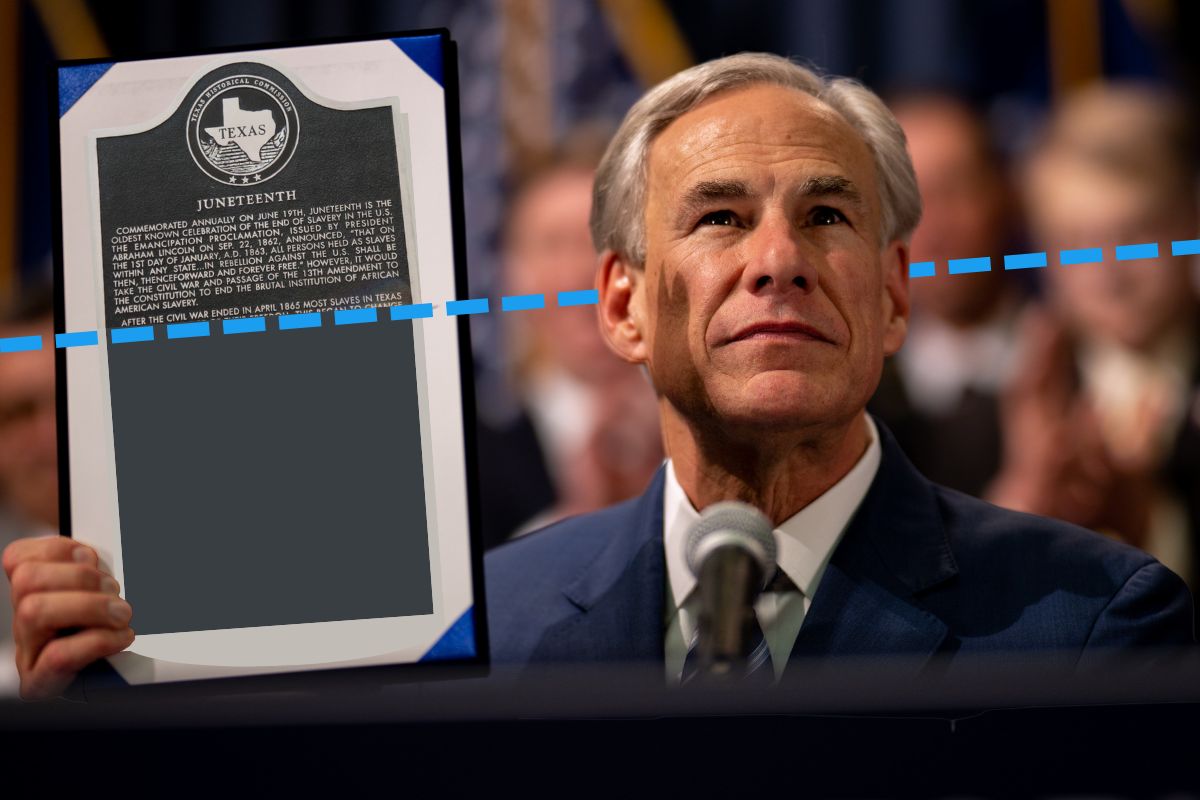Greg Abbott’s Juneteenth Tweet Purposely Crops Out the Reason for the Holiday

Days after Texas Governor Greg Abbott gleefully signed a bill banning Diversity, Equity, and Inclusion offices, training, and programs, he sent out his annual acknowledgment of Juneteenth. While many governors across the U.S. have started making statements about the holiday, Abbott’s voice holds the most weight because the observance is a Texas tradition—specifically in the Houston/Galveston area. (And northern Mexico.) With Texas declaring Juneteenth a state holiday in 1980, the bar was very low, and yet Abbott couldn’t clear it.
Yesterday, the Texas Governor tweeted an image of the Juneteenth plaque placed in Galveston by the Texas Historical Commission in 2014. In this tweet, he also managed to crop out roughly two-thirds of the already abbreviated history.
Commemorated annually on June 19th, Juneteenth is the oldest known celebration of the end of slavery in the U.S. The Emancipation Proclamation, issued by President Abraham Lincoln on Sep. 22, 1862, announced, “That on the 1st day of January. A.D. 1863, all person held as slaves within any state…in rebellion against the U.S. shall be then, thenceforward and forever free.” However, it would take the Civil War and passage of the 13th Amendment to the Constitution to end the brutal institution of African American slavery.
After the Civil War ended in April 1865 most slaves in Texas were still unaware of their freedom.
Someone else, regardless of party, might have been given the benefit of the doubt, but Abbott pulls moves like this frequently.
What did Abbott leave out?

This is actually the fourth time Abbott has done this. He’s tweeted the exact same picture from his camera roll three times since 2017. Each time it conveniently crops out how Juneteenth is in part possible thanks to federal government interference; that the white people in the state of Texas (slavers or not) had to be babysat. The rest reads:
This began to change when Union troops arrived in Galveston. Maj. Gen. Gordon Granger, commanding officer, District of Texas, from his headquarters in the Osterman building (Strand and 22nd St.), read ‘General Order No. 3’ on June 19, 1865. The order stated “The people of Texas are informed that, in accordance with a proclamation from the executive of the United States, all slaves are free. This involves an absolute equality of personal rights and rights of property between former masters and slaves.” With this notice, reconstruction era Texas began.
Freed African Americans observed “Emancipation Day,” as it was first known, as early as 1866 in Galveston. As community gatherings grew across Texas, celebrations included parades, prayer, singing and readings of the proclamation. In the mid-20th century, community celebrations gave way to more private commemorations. A re-emergence of public observance helped Juneteenth become a state holiday in 1979. Initially observed in Texas, this landmark event’s legacy is evident today by worldwide commemorations that celebrate freedom and the triumph of the human spirit.
If this happened in a vacuum, there wouldn’t be a big issue, only a slight annoyance. However, this choice comes as Black history continues to be attacked and censored out of education and libraries. It’s not too far off from Governor Sarah Huckabee Sanders of Arkansas promoting legislation that would limit discussion of the Civil Rights Era while being a visiting alumna of Little Rock Central High School.
Outside of the classroom, rights won during the Civil Rights era are slowly being peeled back by SCOTUS. Even more are being challenged daily by Abbott, his donors, and his fellow members of the Texas Republican Party. While in 2019 he and others agreed to remove a Confederate plaque falsely claiming slavery wasn’t the cause of the Civil War, they refuse to allow educators to teach otherwise.
The text on the Juneteenth plaque has its issues, but it at least attempts to portray a fuller picture of the story—the part of the story that shows the past failures of Texas. And the parts that show the Black community’s autonomy in rallying behind this date with or without formal recognition.
(featured image: photo by Brandon Bell, Getty Images / remixed by Alyssa Shotwell)
Have a tip we should know? [email protected]
